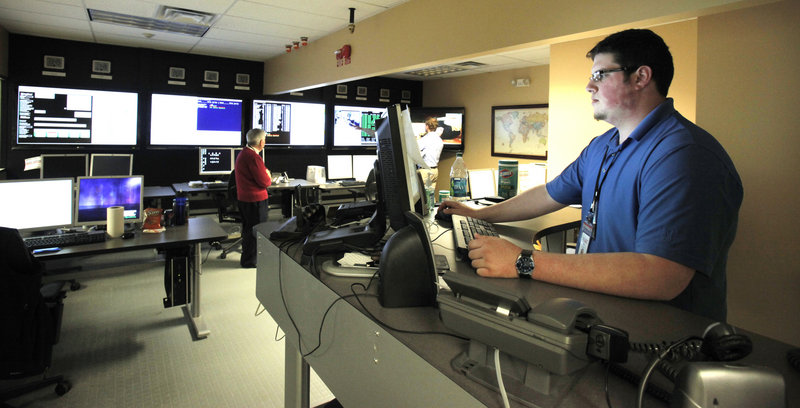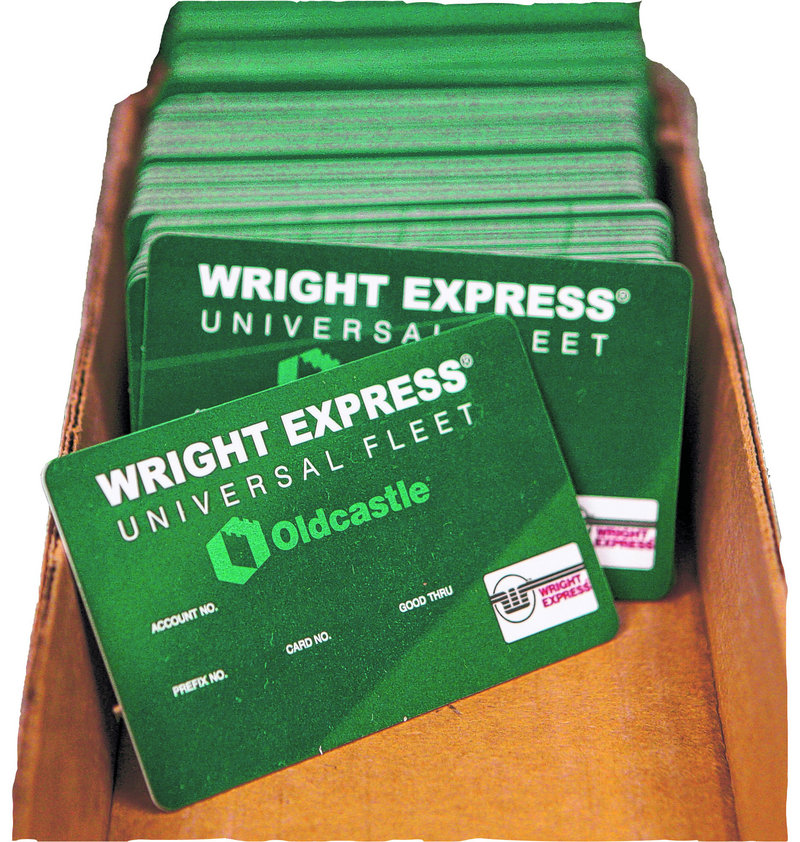SOUTH PORTLAND – Twenty-eight years ago, Wright Express operated a fuel purchase system at two gas stations in Portland and one in South Portland.
Today, the company’s fuel credit cards are accepted at most of the nation’s 150,000 stations and at gas pumps overseas.
With nearly $400 million in annual revenue, the South Portland-based company has become one of the largest players in the back-office business of processing fuel purchases.
President and CEO Michael Dubyak attributes his company’s growth to a loyal work force, business diversification and continuing overseas acquisitions.
“We are looking to be aggressive,” said Dubyak from his corner office at Wright Express’ Gorham Road headquarters. “We built our reputation in North America. (Now is our) opportunity to expand internationally.”
Processing fuel purchases is the primary business of Wright Express, which employs 872 staff, including 562 in South Portland.
On Wednesday, the director of data center operations, Alfred LeDoux, pointed to a computer screen in Wright Express’ operations center on Darling Avenue.
“This is what we call our cash register. This is the money coming in,” said LeDoux.
The screen flashed the names of dozens of U.S. cities, including Omaha, Grand Rapids, Tulsa, Tampa and Altoona — places where customers were using Wright Express credit cards to purchase gas or diesel at that moment.
Transactions like these account for 70 percent of Wright Express’ yearly revenue.
The company makes money by issuing Wright Express fuel cards to firms that own fleets of vehicles. Drivers swipe the card at the pump and enter their employee ID number and, in some cases, an odometer reading.
Computers in the pump talk to computers at Wright Express , which approves or denies the transaction.
Like other credit card companies, Wright Express earns money by keeping a percentage of each transaction, paid by vendors.
Though Wright Express cards function like other credit cards, Dubyak said his company offers security and reporting that other cards don’t.
Wright Express tracks fuel efficiency and cost-per-transaction, location and time — data clients use to analyze spending and compare fuel use across vehicles, divisions and regions, Dubyak said.
Wright Express also processes purchases on cards issued by oil companies, such as Sunoco Inc. and ExxonMobil.
In addition, Wright Express owns a bank in Utah, through which the company issues corporate MasterCards. The cards are used by travel agencies like Priceline to pay hotel and car rental partners, said Dubyak.
Wright Express was founded in 1983 by Parker Poole III and William Richardson, relatives of Augustus R. Wright, who started the coal delivery business A.R. Wright in the late 1800s.
Poole’s and Richardson’s idea was an electronic fuel purchase system that would let fleet owners track spending.
At first, the system only worked at three local gas stations — one was the current Irving station on Commercial Street in Portland.
In 1985, the company raised venture capital and hired new staff, including Dubyak. And in 1986, Getty Petroleum agreed to accept Wright Express credit cards at all their 2,200 stations. Deals with Texaco, ExxonMobil and Canada’s Imperial Oil followed.
Wright Express had a number of corporate owners over the years, including now-defunct Cendant Corporation, which went public with Wright Express in 2005.
Today, 90 percent of the roughly 150,000 U.S. gas stations and truck stops accept Wright Express cards, said Dubyak.
The company services some 5.4 million vehicles worldwide and has some 280,000 fleet customers in the United States, including hundreds in Maine. Clients include large companies like AT&T, local small businesses, state governments and federal agencies.
A few years ago, Wright Express began a series of expansions. In 2007, the company launched a Canadian banking operation and acquired Louisville, Ky.-based supply chain software company TelaPoint Inc.
In 2008, Wright Express acquired Salem, Org.-based Pacific Pride Services Inc., a commercial fueling company, and New Zealand-based software company Financial Automation Limited.
In 2010, Wright Express purchased an Australian firm, and in April the company acquired Florida-based rapid! PayCard, which sells systems that enable companies to pay employees with debit cards.
Dubyak called the Florida acquisition a diversification into a new, potentially high-growth industry. He said he will cross sell the debit card system to existing clients.
Earlier this month, Wright Express announced management changes and created a new position, head of U.S. operations, which Dubyak said will give him more time to focus on international strategy.
“I will be spending more time internationally to develop the business,” he said.
Dubyak said more expansion is likely to follow, possibly in South America or Europe.
Ben Clark, senior vice president of Bayside Wealth Management, a Portland-based division of UBS Financial Services, said Wright Express’ recent purchases reflect broader corporate trends.
He said merger and acquisition activity has recently increased, indicating executives are growing confident in the economy. And after a few years of stockpiling cash, companies have money to invest.
Wright Express’ revenue increased in the years leading up to the recession, but dipped from $393.6 million in 2008 to $315 million in 2009.
In 2010, revenue increased 24 percent to $390.4 million, nearly 70 percent from processing fuel payments.
Though net income for the year declined 37 percent to $87.6 million, Dubyak said a better indicator of the company’s health is adjusted net income, which is not distorted by fuel hedges.
In 2010, adjusted net income grew 25 percent to $107.3 million.
In 2011, Wright Express expects revenue will reach roughly $500 million, driven partly by international growth.
The company’s 2012 goal is $520 million.
Wright Express competitors in the United States include FleetOne, ComData Corporation and FuelMan, a division of FleetCor.
Dubyak said his company is one of the largest processors in the United States and has a powerful proprietary computer network.
He added that during its long history in Maine, Wright Express has acquired a loyal work force with a low turnover rate — both competitive advantages.
But Dubyak fears a shortage of qualified workers in Maine could hamper future growth. The big question is, “Can we find the talent here?”
That’s why he supports more funding for higher education and volunteers as the chair of the board of visitors of the University of Southern Maine.
Jonathan Hemmerdinger can be reached at 791-6316 or:
jhemmerdinger@mainetoday.com
Send questions/comments to the editors.





